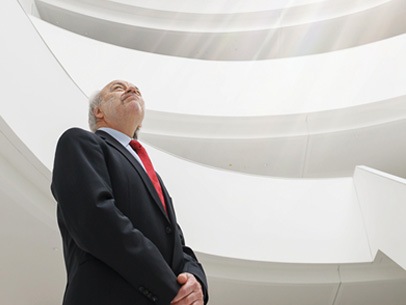 [Image: S. Spangenberg]
[Image: S. Spangenberg]
Only a few years ago, the world seemed to have developed into a place where an unprecedented level of scientific collaboration around the globe had finally become possible. For me, that was a happy development—particularly after centuries of turmoil and war among empires and nations.
I remembered in particular the many wars between Germany and France, culminating in the two World Wars—and followed, in 1963, by the Élisée treaty of friendship signed by the leaders Charles de Gaulle of France and Konrad Adenauer of the Federal Republic of Germany. Remarkably, the treaty contained a plan to establish a high-school student exchange program, which over decades helped Germany and France—long adversaries—to become close allies. The 87-year-old Adenauer and the 72-year-old de Gaulle were surely aware that they would not live to see this exchange program bear fruit. That makes the foresight of these two politicians especially admirable. They had a strategic plan for the betterment of their two nations.
Unfortunately, the spirit of the Élisée treaty has not always been replicated elsewhere. Indeed, the trend toward international cooperation lately seems to have reversed—and that is affecting not only international science, but international scientific societies.
To be truly effective, such a society must be truly global, with member and leadership representation from all continents, from the board of directors on down. Yet such a society must also be registered, which can only be done in a single, specific country—and that country’s legislation and regulations apply.
Science, after all, benefits immensely from cross-border exchange, as such inclusivity helps scientists and engineers work together to find the best solutions to the world’s problems.
In an ideal world, that would hardly matter. But in one where tensions between countries are re-emerging, it may well restrict the society’s operations, posing challenges for organizations seeking to work internationally. Science, after all, benefits immensely from cross-border exchange, as such inclusivity—a core value of Optica—helps scientists and engineers work together to find the best solutions to the world’s problems.
I do not have an answer to this dilemma. But in thinking about the current worsening situation, some verses came to my mind by Walther von der Vogelweide, perhaps the best-known German poet from the Middle Ages. Some 800 years ago, he reflected on how worldly honor, material possessions and divine grace—the “other three” in the extract below—cannot coexist “within a single heart” in a world of division and injustice:
I sat upon a rock / and crossed my legs / and propped my elbow on my knee, / and cradled chin and cheek / inside my hand. / And pondered very seriously / How one should lead one’s life on Earth … / Betrayal lies in ambush now / and violence roams the streets. / Peace and justice have the deepest wounds. / Until these two are first restored, / the other three will be without a guard. [Translation from LyricsTranslate.com]
This English translation of a short extract from a much longer poem does not do justice to the original. But I believe the flavor comes across: A lonely poet—or a lonely scientist, for that matter—hoping for better times!
—Gerd Leuchs,
Optica President
View Chinese, French, Japanese, Korean and Spanish translations of this message:

